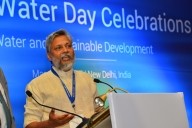
New Delhi, March 20 (IANS) Earth would face 40 percent shortfall of fresh water by the year 2030 if management of the precious resource is not improved, the United Nations World Water Development Report-2015 said.
In 2000, India had nearly 19 million tube wells, compared to less than a million in 1960. This technological revolution has played an important role in the country's efforts to combat poverty, but the ensuing development of irrigation has, in turn, resulted in significant water stress in some regions of the country, such as Maharashtra and Rajasthan, said the report - "Water for a Sustainable World".
It said that to answer the needs of an ever-growing population, the agriculture and energy sectors have to keep producing more and more. From now until 2050, agriculture, which consumes most water, has to produce 60 percent more food globally, and 100 percent in developing countries. Demand for manufactured goods is also increasing, which, in turn, puts further pressure on water resources.
Between 2000 and 2050, the demand for water by industry is expected to increase by 400 percent.
It is expected to increase by 55 percent by 2050 - and 20 percent of global groundwater sources are already over exploited.
Intensive irrigation, uncontrolled release of pesticides and chemicals into watercourses and the absence of waste water treatment - which is the case for 90 percent of waste water in developing countries - are all proof of this state of affairs, the report cautioned.
The report was released here by Minister of State for Water Resources, River Development and Ganga Rejuvenation Sanwar Lal Jat.
Releasing the report the minister said: "Water is sacred and worshipped as god in Indian civilization. The national water policy adopts an integrated approach to water management which is vital for poverty reduction, environmental sustenance and sustainable economic development".
He also stressed the need to change the way we use and manage this vital resource.
In his remarks on the occasion, Michel Jarraud, chair, UN-Water and Secretary-General, World Meteorological Organization (WMO) said issues related to fresh water are linked with various things and cannot be seen in isolation.
Urging people to use water judiciously, the UN official said, "we need to work together (to save water) as stakes are very high and we cannot sit back".
"There is already international consensus that water and sanitation are essential to the achievement of many sustainable development goals. They are inextricably linked to climate change, agriculture, food security, health, energy, equality, gender and education. Now, we must look forward to measurability, monitoring and implementation", Jarraud said.
Flavia Schlegel, Assistant Director-General for Natural Sciences, UNESCO, also echoed the same sentiments saying that water was one substance which touches life in more ways than any other, thus must be saved for overall interest of humanity.
After getting bail to Aryan Khan and other accused in the Mumbai drugs case, now the case of 'her
Scheduled Caste (SC) and Scheduled Tribe (ST) voters will play an important role in dec
The National Testing Agency (NTA) has released the results of the Joint Entrance E
The country is going to get a new president in July. In such a situation, everyone's eyes are fix
Prime Minister Narendra Modi made a big announcement during his interaction with start-ups on Sat
How to play PUBG Mobile India, pre-registration, know what will be special in this time game
Now, the curiosity of PUBG enthusiasts is increasing due to the return of PUBG to India. It is be
Railway platform tickets to cost Rs.10 from April 1
New Delhi, March 23 (IANS) Come April 1, platform tickets
Since Gautam Gambhir became the head coach of the Indian team, Team India has suffered two clean
The entire National Capital Region (NCR), including Delhi, seems to be getting relief from air po
Ukraine Russia War: Russian Foreign Minister Sergei Lavrov said on Thursday that Moscow will cont